Organizational Change: Leadership and Culture Transformation
VerifiedAdded on 2023/06/07
|8
|1422
|361
Literature Review
AI Summary
This paper provides a literature review and critique on the role of leadership and culture change during transformational change within organizations. It examines various authors' perspectives, highlighting the vital role of leadership in initiating and coordinating change, managing resistance, and making strategic decisions. The review also emphasizes the importance of cultural change, including shifts in goals, values, and communication practices, to support transformational change. The critique assesses the strengths and limitations of different viewpoints, concluding that effective leadership and cultural adaptation are essential for successful organizational transformation, ensuring employees understand and embrace the necessary changes for the future success of the company. The literature review further posits that the leader needs to educate employees about the use of technology or processes.
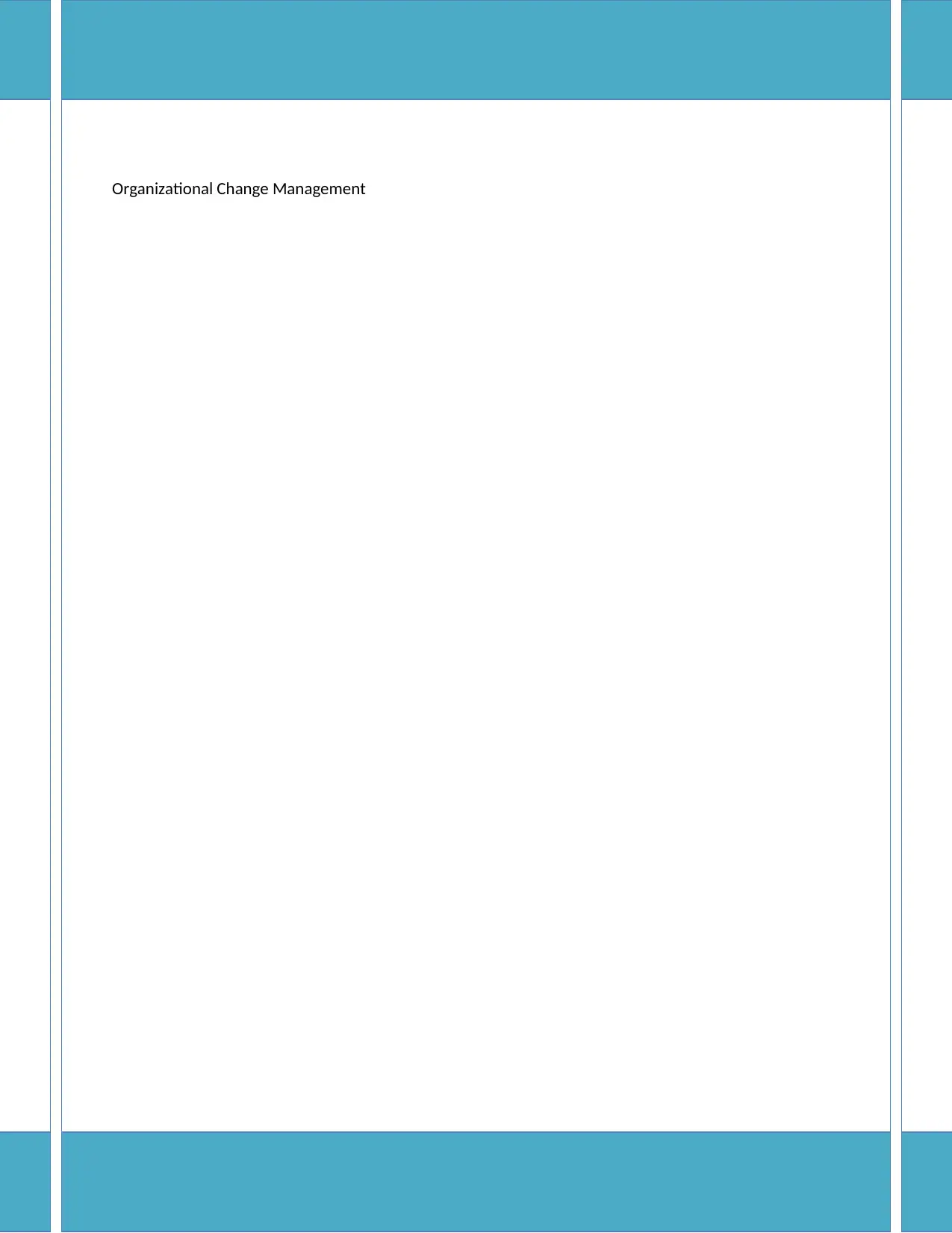
Organizational Change Management
Paraphrase This Document
Need a fresh take? Get an instant paraphrase of this document with our AI Paraphraser
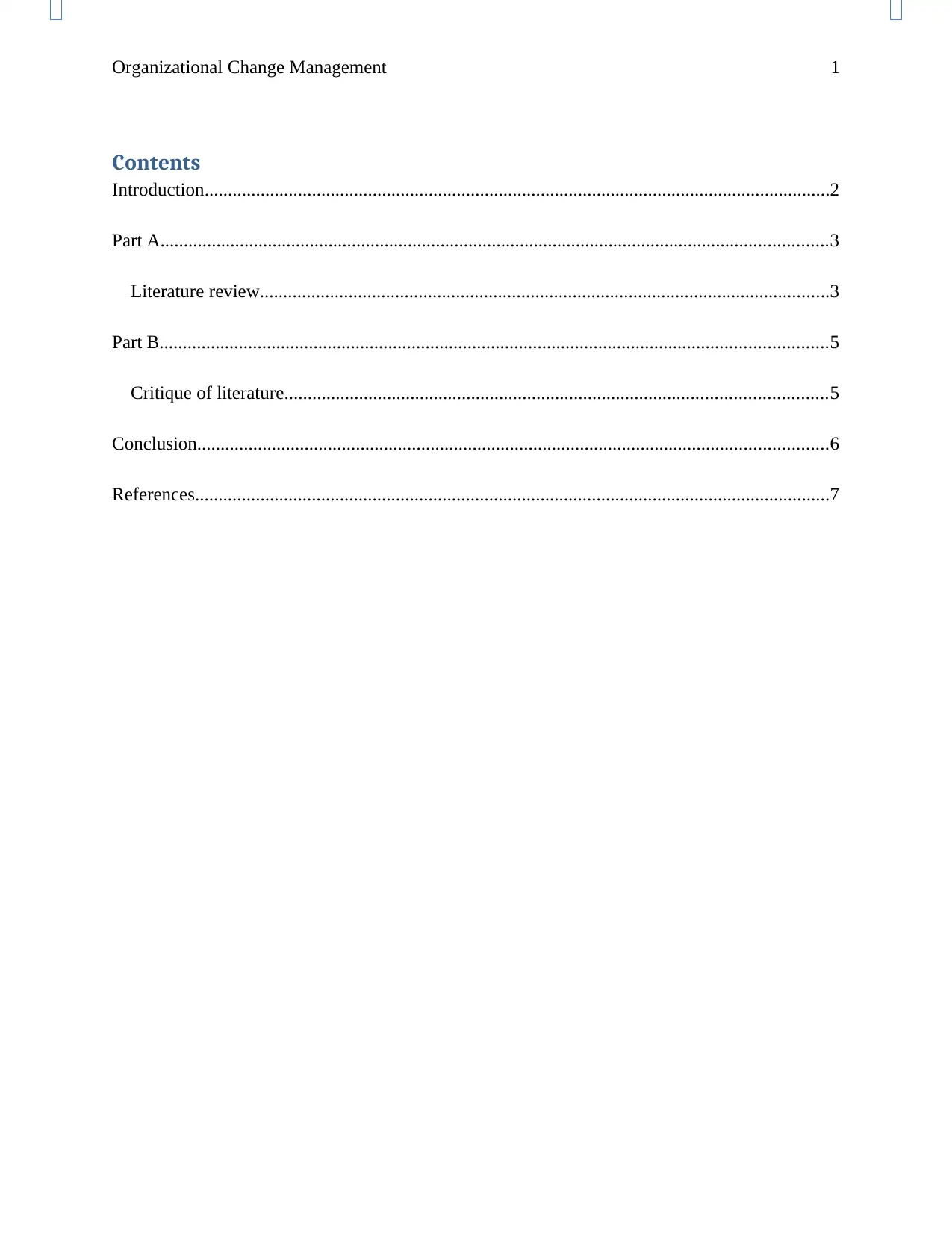
Organizational Change Management 1
Contents
Introduction......................................................................................................................................2
Part A...............................................................................................................................................3
Literature review..........................................................................................................................3
Part B...............................................................................................................................................5
Critique of literature....................................................................................................................5
Conclusion.......................................................................................................................................6
References........................................................................................................................................7
Contents
Introduction......................................................................................................................................2
Part A...............................................................................................................................................3
Literature review..........................................................................................................................3
Part B...............................................................................................................................................5
Critique of literature....................................................................................................................5
Conclusion.......................................................................................................................................6
References........................................................................................................................................7
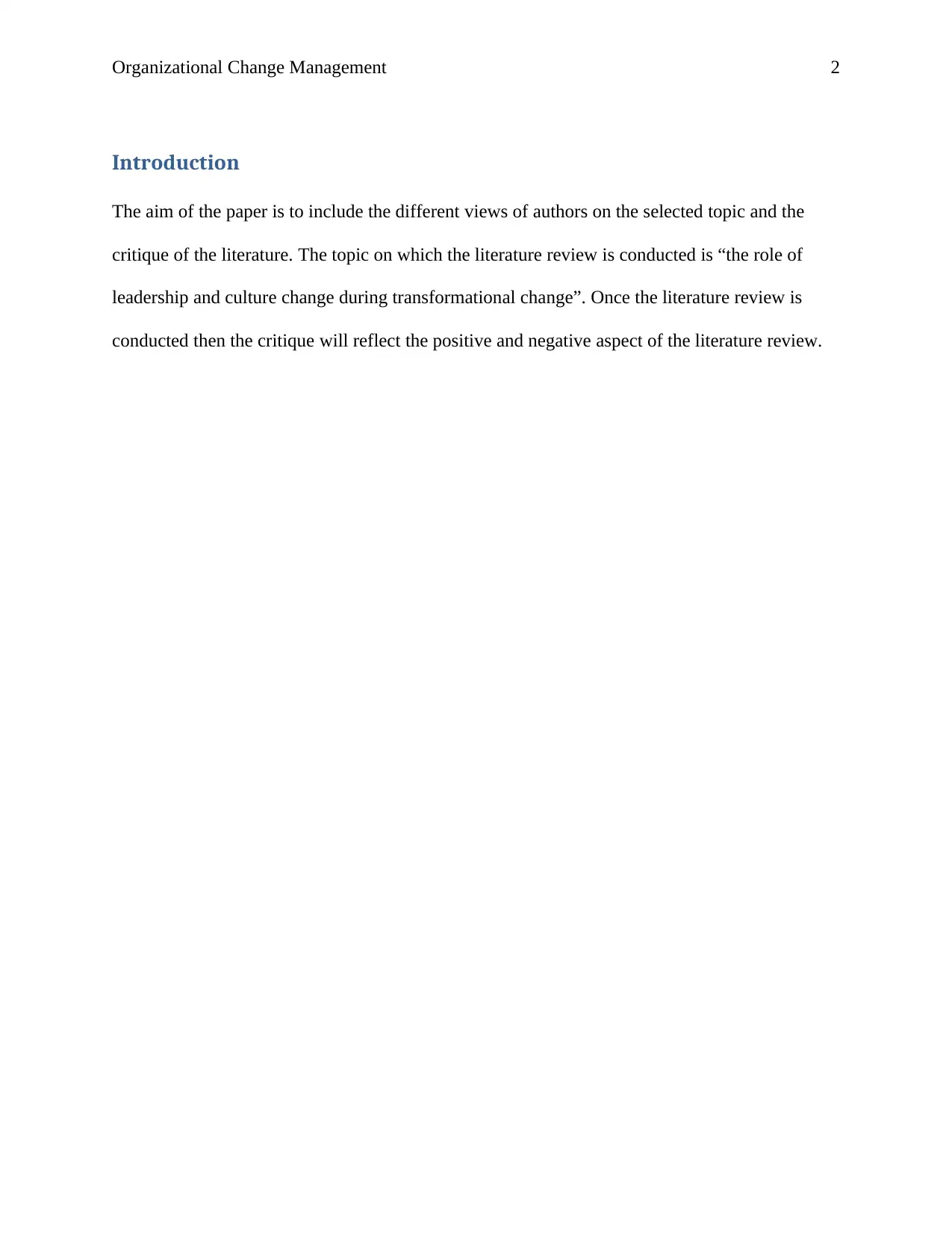
Organizational Change Management 2
Introduction
The aim of the paper is to include the different views of authors on the selected topic and the
critique of the literature. The topic on which the literature review is conducted is “the role of
leadership and culture change during transformational change”. Once the literature review is
conducted then the critique will reflect the positive and negative aspect of the literature review.
Introduction
The aim of the paper is to include the different views of authors on the selected topic and the
critique of the literature. The topic on which the literature review is conducted is “the role of
leadership and culture change during transformational change”. Once the literature review is
conducted then the critique will reflect the positive and negative aspect of the literature review.
⊘ This is a preview!⊘
Do you want full access?
Subscribe today to unlock all pages.

Trusted by 1+ million students worldwide
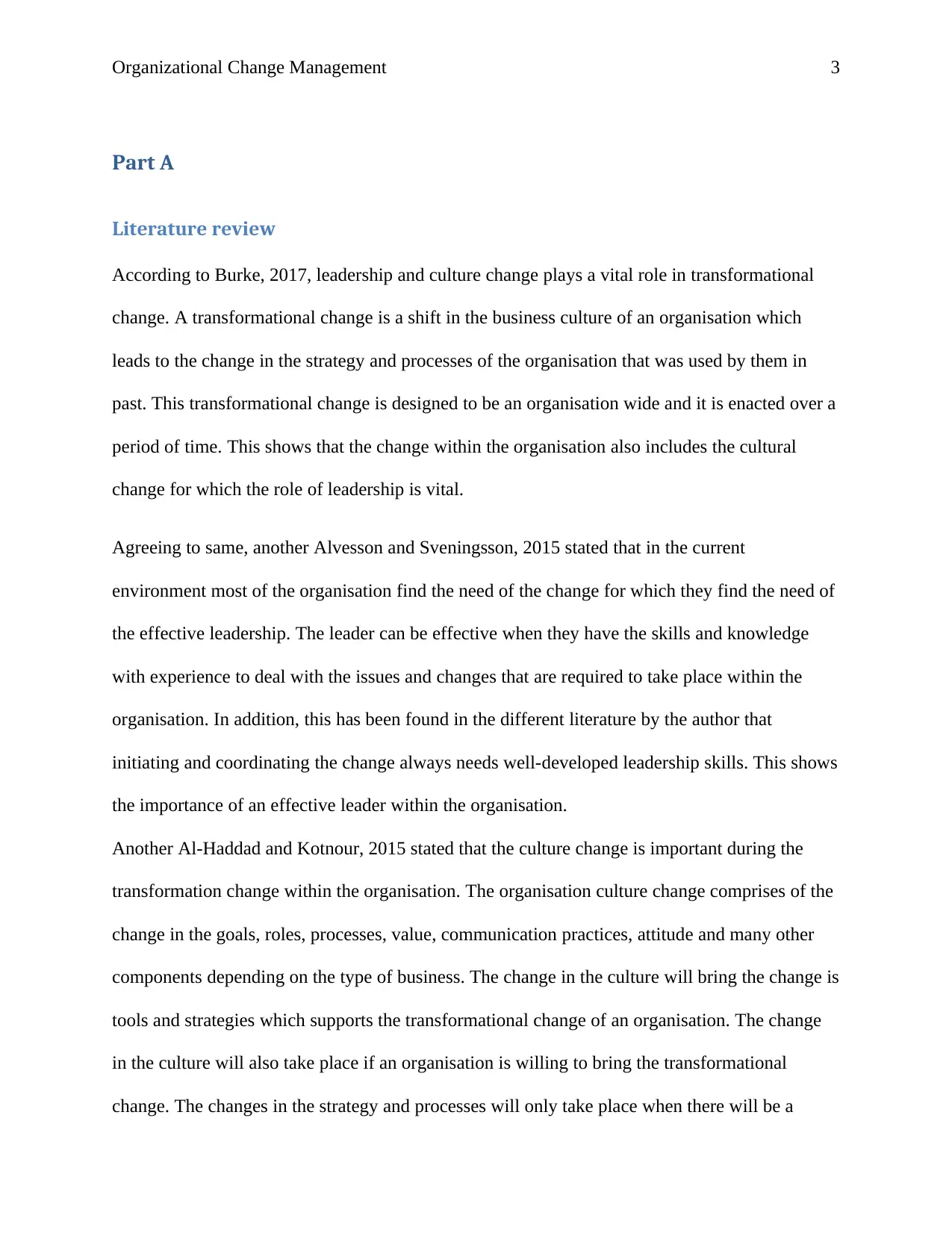
Organizational Change Management 3
Part A
Literature review
According to Burke, 2017, leadership and culture change plays a vital role in transformational
change. A transformational change is a shift in the business culture of an organisation which
leads to the change in the strategy and processes of the organisation that was used by them in
past. This transformational change is designed to be an organisation wide and it is enacted over a
period of time. This shows that the change within the organisation also includes the cultural
change for which the role of leadership is vital.
Agreeing to same, another Alvesson and Sveningsson, 2015 stated that in the current
environment most of the organisation find the need of the change for which they find the need of
the effective leadership. The leader can be effective when they have the skills and knowledge
with experience to deal with the issues and changes that are required to take place within the
organisation. In addition, this has been found in the different literature by the author that
initiating and coordinating the change always needs well-developed leadership skills. This shows
the importance of an effective leader within the organisation.
Another Al-Haddad and Kotnour, 2015 stated that the culture change is important during the
transformation change within the organisation. The organisation culture change comprises of the
change in the goals, roles, processes, value, communication practices, attitude and many other
components depending on the type of business. The change in the culture will bring the change is
tools and strategies which supports the transformational change of an organisation. The change
in the culture will also take place if an organisation is willing to bring the transformational
change. The changes in the strategy and processes will only take place when there will be a
Part A
Literature review
According to Burke, 2017, leadership and culture change plays a vital role in transformational
change. A transformational change is a shift in the business culture of an organisation which
leads to the change in the strategy and processes of the organisation that was used by them in
past. This transformational change is designed to be an organisation wide and it is enacted over a
period of time. This shows that the change within the organisation also includes the cultural
change for which the role of leadership is vital.
Agreeing to same, another Alvesson and Sveningsson, 2015 stated that in the current
environment most of the organisation find the need of the change for which they find the need of
the effective leadership. The leader can be effective when they have the skills and knowledge
with experience to deal with the issues and changes that are required to take place within the
organisation. In addition, this has been found in the different literature by the author that
initiating and coordinating the change always needs well-developed leadership skills. This shows
the importance of an effective leader within the organisation.
Another Al-Haddad and Kotnour, 2015 stated that the culture change is important during the
transformation change within the organisation. The organisation culture change comprises of the
change in the goals, roles, processes, value, communication practices, attitude and many other
components depending on the type of business. The change in the culture will bring the change is
tools and strategies which supports the transformational change of an organisation. The change
in the culture will also take place if an organisation is willing to bring the transformational
change. The changes in the strategy and processes will only take place when there will be a
Paraphrase This Document
Need a fresh take? Get an instant paraphrase of this document with our AI Paraphraser
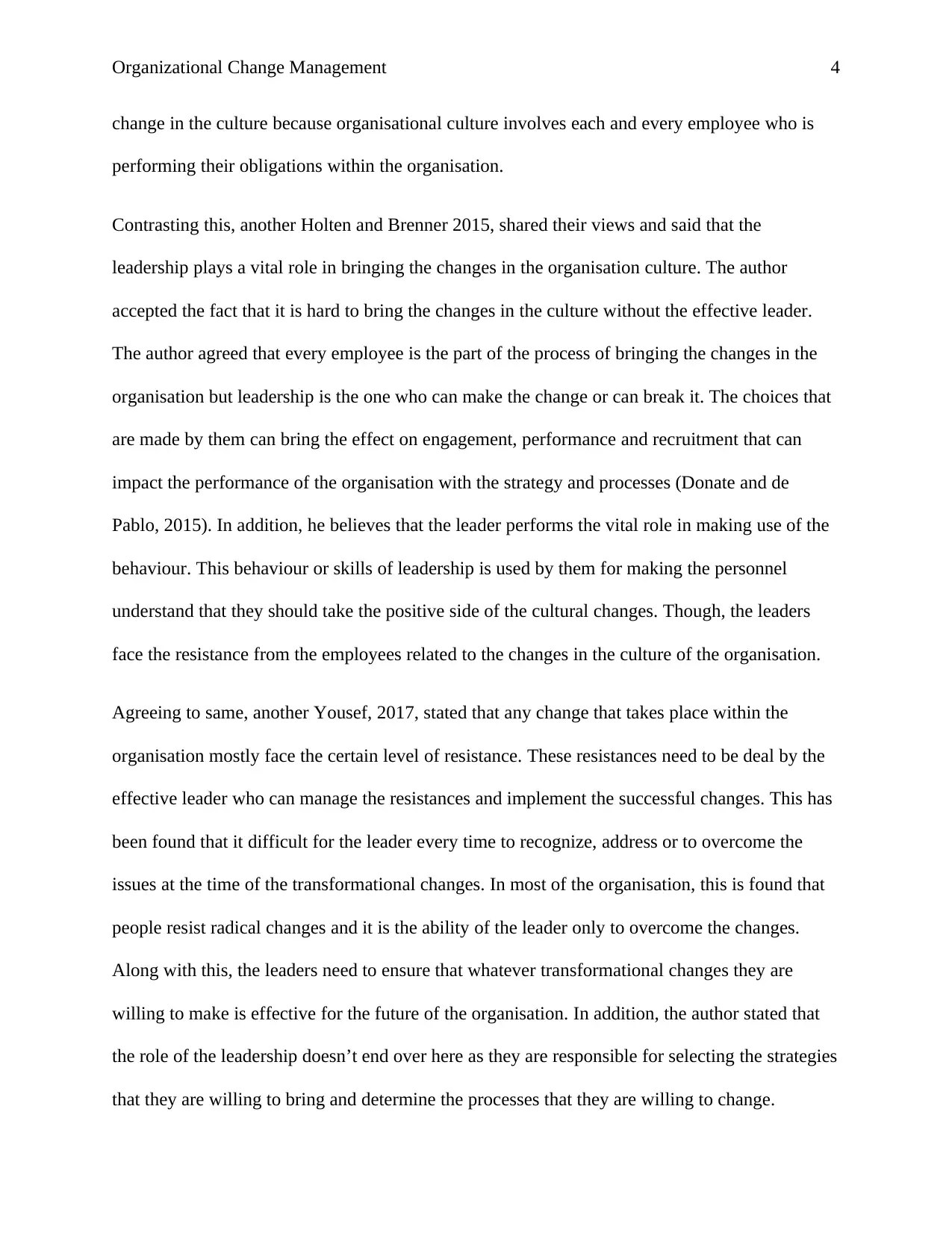
Organizational Change Management 4
change in the culture because organisational culture involves each and every employee who is
performing their obligations within the organisation.
Contrasting this, another Holten and Brenner 2015, shared their views and said that the
leadership plays a vital role in bringing the changes in the organisation culture. The author
accepted the fact that it is hard to bring the changes in the culture without the effective leader.
The author agreed that every employee is the part of the process of bringing the changes in the
organisation but leadership is the one who can make the change or can break it. The choices that
are made by them can bring the effect on engagement, performance and recruitment that can
impact the performance of the organisation with the strategy and processes (Donate and de
Pablo, 2015). In addition, he believes that the leader performs the vital role in making use of the
behaviour. This behaviour or skills of leadership is used by them for making the personnel
understand that they should take the positive side of the cultural changes. Though, the leaders
face the resistance from the employees related to the changes in the culture of the organisation.
Agreeing to same, another Yousef, 2017, stated that any change that takes place within the
organisation mostly face the certain level of resistance. These resistances need to be deal by the
effective leader who can manage the resistances and implement the successful changes. This has
been found that it difficult for the leader every time to recognize, address or to overcome the
issues at the time of the transformational changes. In most of the organisation, this is found that
people resist radical changes and it is the ability of the leader only to overcome the changes.
Along with this, the leaders need to ensure that whatever transformational changes they are
willing to make is effective for the future of the organisation. In addition, the author stated that
the role of the leadership doesn’t end over here as they are responsible for selecting the strategies
that they are willing to bring and determine the processes that they are willing to change.
change in the culture because organisational culture involves each and every employee who is
performing their obligations within the organisation.
Contrasting this, another Holten and Brenner 2015, shared their views and said that the
leadership plays a vital role in bringing the changes in the organisation culture. The author
accepted the fact that it is hard to bring the changes in the culture without the effective leader.
The author agreed that every employee is the part of the process of bringing the changes in the
organisation but leadership is the one who can make the change or can break it. The choices that
are made by them can bring the effect on engagement, performance and recruitment that can
impact the performance of the organisation with the strategy and processes (Donate and de
Pablo, 2015). In addition, he believes that the leader performs the vital role in making use of the
behaviour. This behaviour or skills of leadership is used by them for making the personnel
understand that they should take the positive side of the cultural changes. Though, the leaders
face the resistance from the employees related to the changes in the culture of the organisation.
Agreeing to same, another Yousef, 2017, stated that any change that takes place within the
organisation mostly face the certain level of resistance. These resistances need to be deal by the
effective leader who can manage the resistances and implement the successful changes. This has
been found that it difficult for the leader every time to recognize, address or to overcome the
issues at the time of the transformational changes. In most of the organisation, this is found that
people resist radical changes and it is the ability of the leader only to overcome the changes.
Along with this, the leaders need to ensure that whatever transformational changes they are
willing to make is effective for the future of the organisation. In addition, the author stated that
the role of the leadership doesn’t end over here as they are responsible for selecting the strategies
that they are willing to bring and determine the processes that they are willing to change.
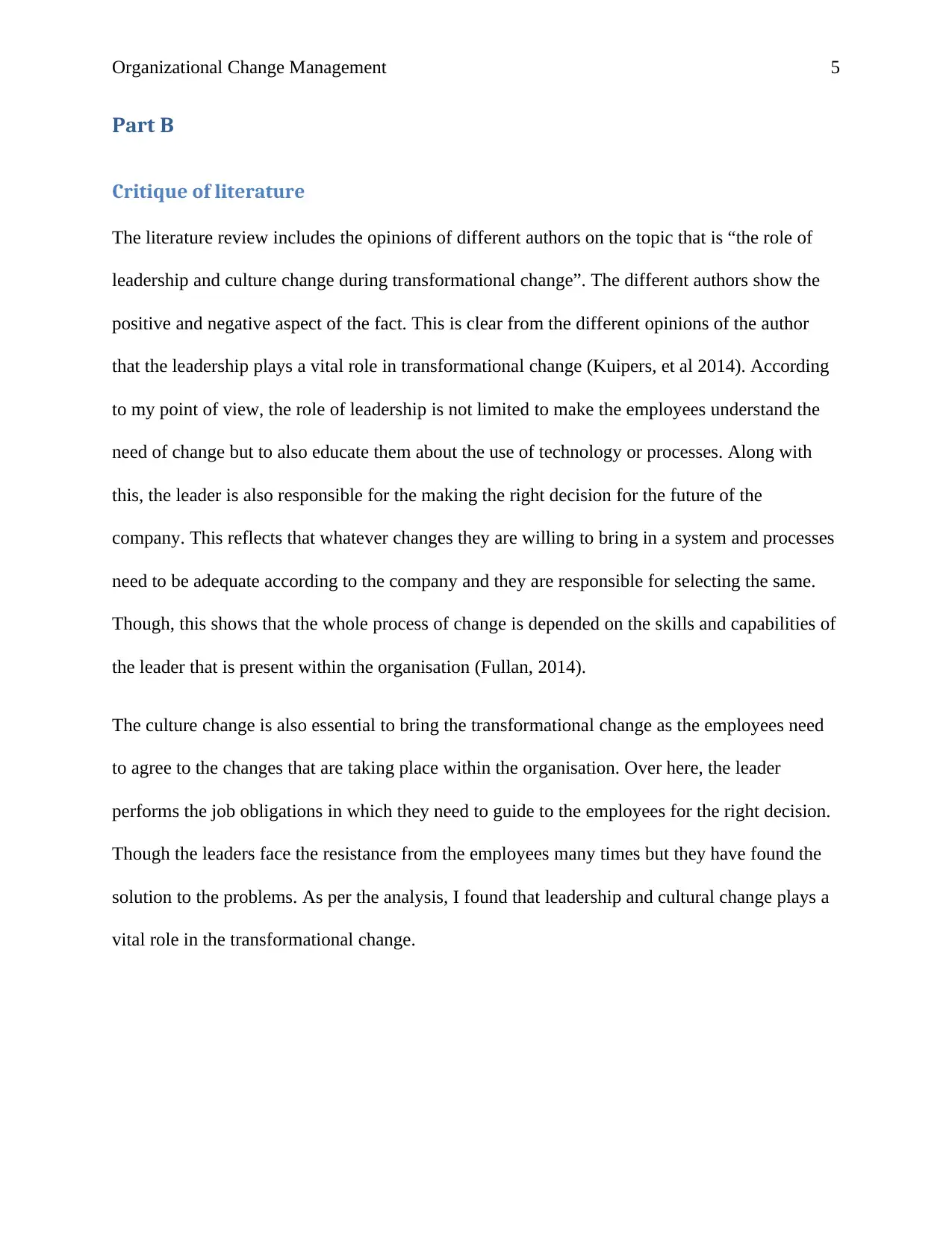
Organizational Change Management 5
Part B
Critique of literature
The literature review includes the opinions of different authors on the topic that is “the role of
leadership and culture change during transformational change”. The different authors show the
positive and negative aspect of the fact. This is clear from the different opinions of the author
that the leadership plays a vital role in transformational change (Kuipers, et al 2014). According
to my point of view, the role of leadership is not limited to make the employees understand the
need of change but to also educate them about the use of technology or processes. Along with
this, the leader is also responsible for the making the right decision for the future of the
company. This reflects that whatever changes they are willing to bring in a system and processes
need to be adequate according to the company and they are responsible for selecting the same.
Though, this shows that the whole process of change is depended on the skills and capabilities of
the leader that is present within the organisation (Fullan, 2014).
The culture change is also essential to bring the transformational change as the employees need
to agree to the changes that are taking place within the organisation. Over here, the leader
performs the job obligations in which they need to guide to the employees for the right decision.
Though the leaders face the resistance from the employees many times but they have found the
solution to the problems. As per the analysis, I found that leadership and cultural change plays a
vital role in the transformational change.
Part B
Critique of literature
The literature review includes the opinions of different authors on the topic that is “the role of
leadership and culture change during transformational change”. The different authors show the
positive and negative aspect of the fact. This is clear from the different opinions of the author
that the leadership plays a vital role in transformational change (Kuipers, et al 2014). According
to my point of view, the role of leadership is not limited to make the employees understand the
need of change but to also educate them about the use of technology or processes. Along with
this, the leader is also responsible for the making the right decision for the future of the
company. This reflects that whatever changes they are willing to bring in a system and processes
need to be adequate according to the company and they are responsible for selecting the same.
Though, this shows that the whole process of change is depended on the skills and capabilities of
the leader that is present within the organisation (Fullan, 2014).
The culture change is also essential to bring the transformational change as the employees need
to agree to the changes that are taking place within the organisation. Over here, the leader
performs the job obligations in which they need to guide to the employees for the right decision.
Though the leaders face the resistance from the employees many times but they have found the
solution to the problems. As per the analysis, I found that leadership and cultural change plays a
vital role in the transformational change.
⊘ This is a preview!⊘
Do you want full access?
Subscribe today to unlock all pages.

Trusted by 1+ million students worldwide
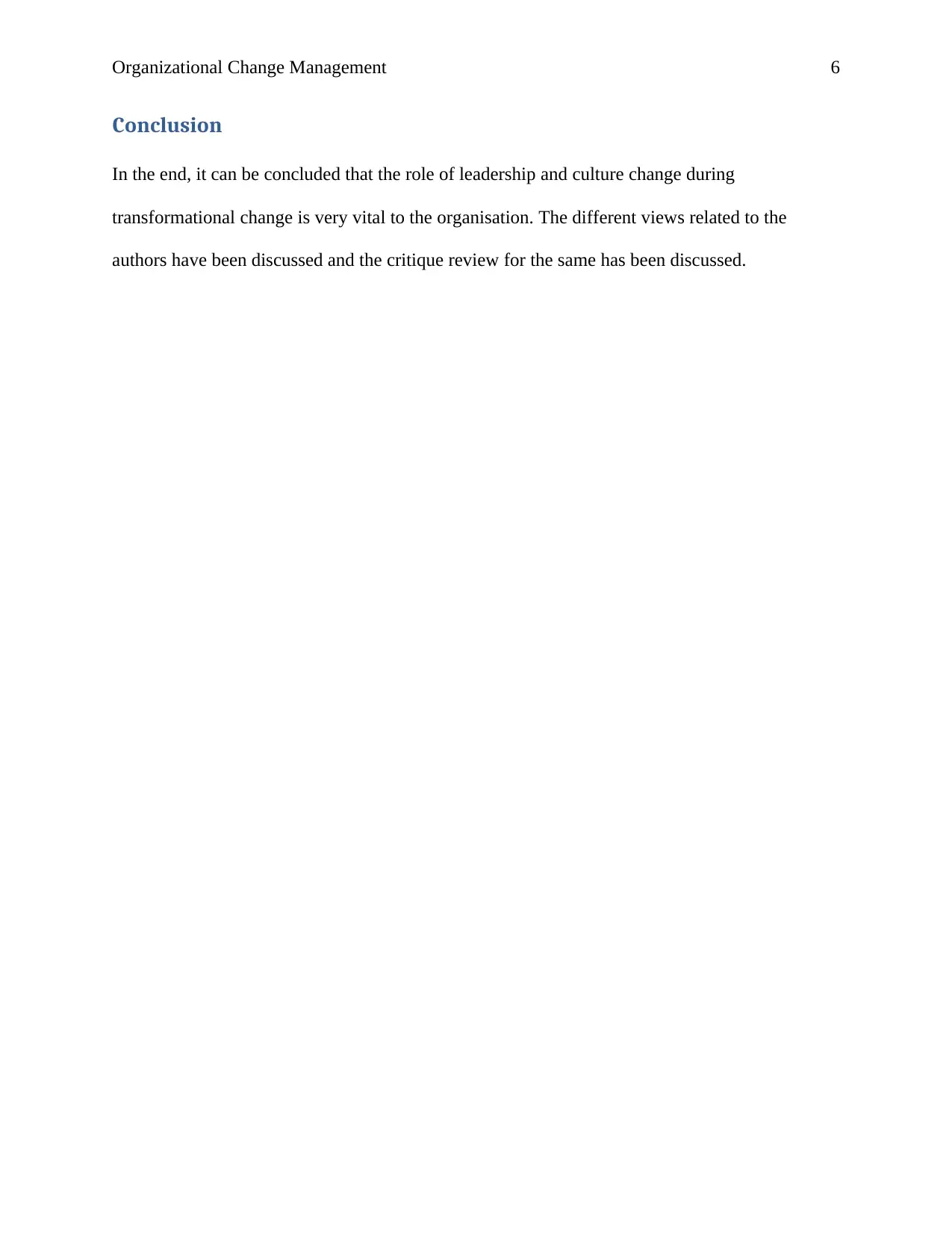
Organizational Change Management 6
Conclusion
In the end, it can be concluded that the role of leadership and culture change during
transformational change is very vital to the organisation. The different views related to the
authors have been discussed and the critique review for the same has been discussed.
Conclusion
In the end, it can be concluded that the role of leadership and culture change during
transformational change is very vital to the organisation. The different views related to the
authors have been discussed and the critique review for the same has been discussed.
Paraphrase This Document
Need a fresh take? Get an instant paraphrase of this document with our AI Paraphraser
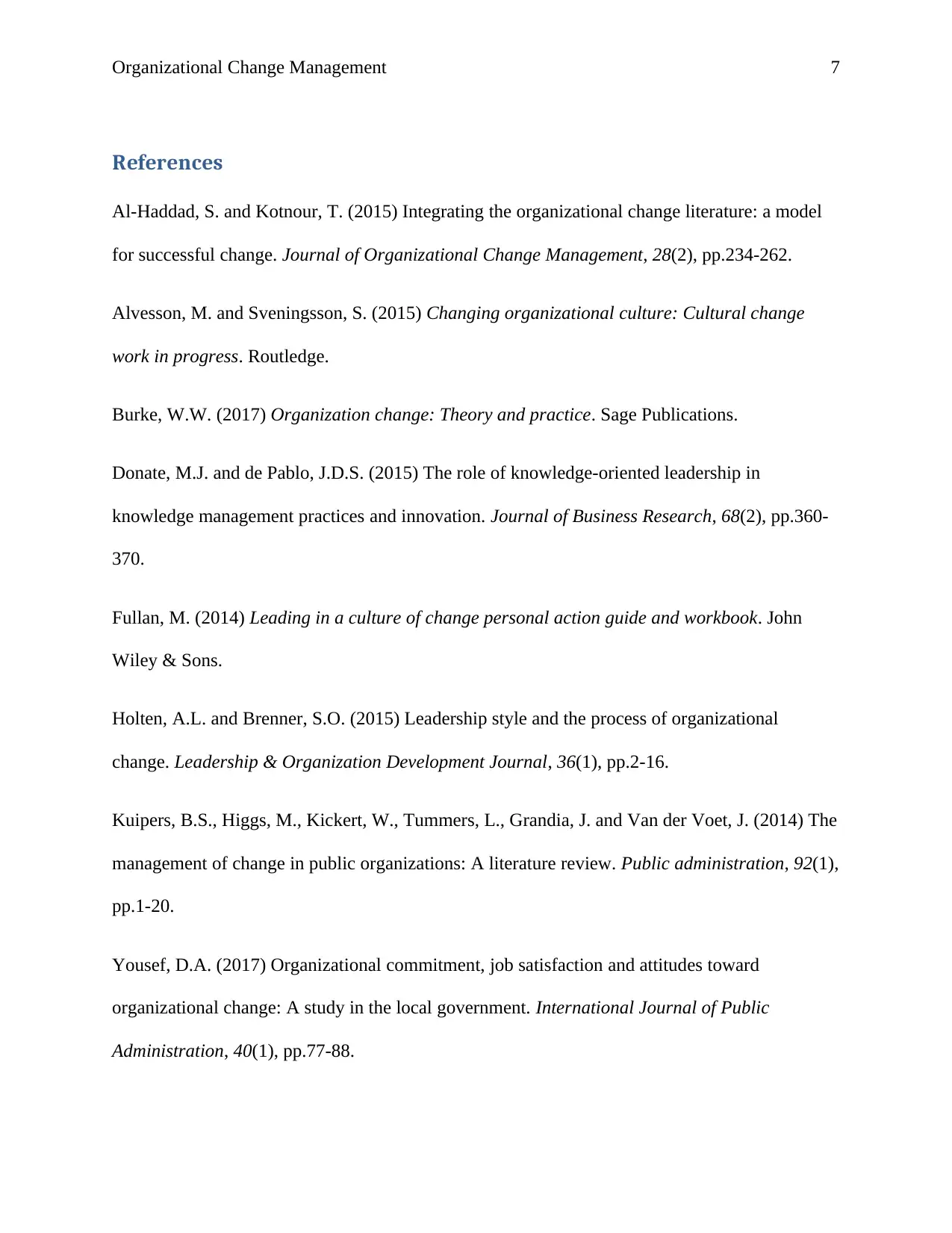
Organizational Change Management 7
References
Al-Haddad, S. and Kotnour, T. (2015) Integrating the organizational change literature: a model
for successful change. Journal of Organizational Change Management, 28(2), pp.234-262.
Alvesson, M. and Sveningsson, S. (2015) Changing organizational culture: Cultural change
work in progress. Routledge.
Burke, W.W. (2017) Organization change: Theory and practice. Sage Publications.
Donate, M.J. and de Pablo, J.D.S. (2015) The role of knowledge-oriented leadership in
knowledge management practices and innovation. Journal of Business Research, 68(2), pp.360-
370.
Fullan, M. (2014) Leading in a culture of change personal action guide and workbook. John
Wiley & Sons.
Holten, A.L. and Brenner, S.O. (2015) Leadership style and the process of organizational
change. Leadership & Organization Development Journal, 36(1), pp.2-16.
Kuipers, B.S., Higgs, M., Kickert, W., Tummers, L., Grandia, J. and Van der Voet, J. (2014) The
management of change in public organizations: A literature review. Public administration, 92(1),
pp.1-20.
Yousef, D.A. (2017) Organizational commitment, job satisfaction and attitudes toward
organizational change: A study in the local government. International Journal of Public
Administration, 40(1), pp.77-88.
References
Al-Haddad, S. and Kotnour, T. (2015) Integrating the organizational change literature: a model
for successful change. Journal of Organizational Change Management, 28(2), pp.234-262.
Alvesson, M. and Sveningsson, S. (2015) Changing organizational culture: Cultural change
work in progress. Routledge.
Burke, W.W. (2017) Organization change: Theory and practice. Sage Publications.
Donate, M.J. and de Pablo, J.D.S. (2015) The role of knowledge-oriented leadership in
knowledge management practices and innovation. Journal of Business Research, 68(2), pp.360-
370.
Fullan, M. (2014) Leading in a culture of change personal action guide and workbook. John
Wiley & Sons.
Holten, A.L. and Brenner, S.O. (2015) Leadership style and the process of organizational
change. Leadership & Organization Development Journal, 36(1), pp.2-16.
Kuipers, B.S., Higgs, M., Kickert, W., Tummers, L., Grandia, J. and Van der Voet, J. (2014) The
management of change in public organizations: A literature review. Public administration, 92(1),
pp.1-20.
Yousef, D.A. (2017) Organizational commitment, job satisfaction and attitudes toward
organizational change: A study in the local government. International Journal of Public
Administration, 40(1), pp.77-88.
1 out of 8
Related Documents
Your All-in-One AI-Powered Toolkit for Academic Success.
+13062052269
info@desklib.com
Available 24*7 on WhatsApp / Email
![[object Object]](/_next/static/media/star-bottom.7253800d.svg)
Unlock your academic potential
Copyright © 2020–2025 A2Z Services. All Rights Reserved. Developed and managed by ZUCOL.





